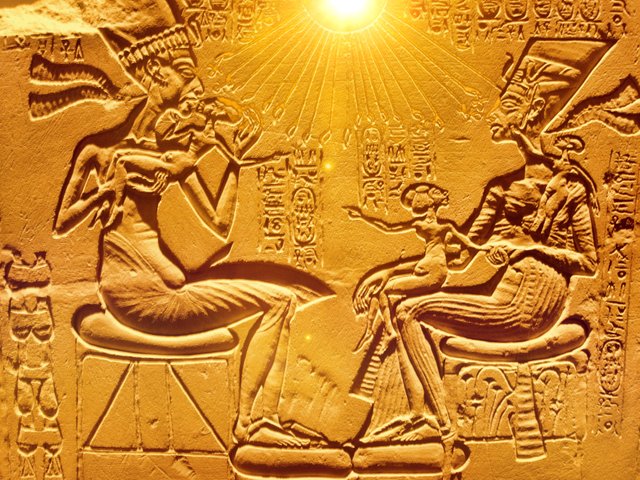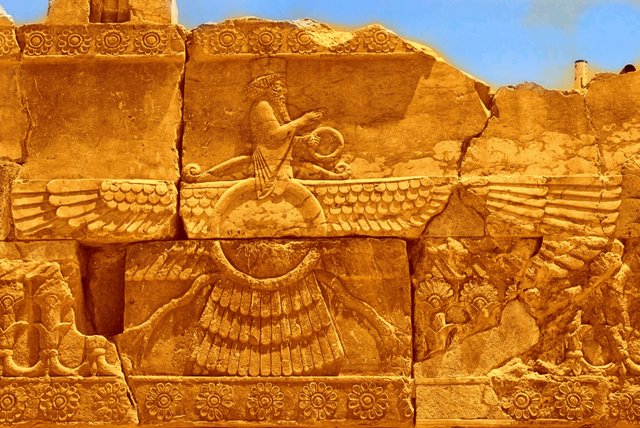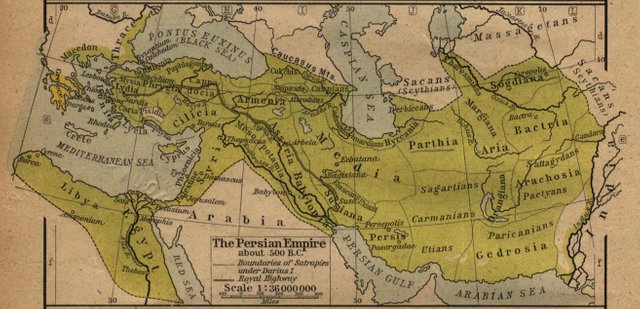
Two ancient figures in particular are often cited as the first monotheist, Akhenaten and Zoroaster.
Try a mind game, imagine you were born into an ancient primitive society. It's easy to understand why intelligent people would seek to explain why and how reality exists. How would your brain explain something like lightening, thunder, storms, floods, meteors, an eclipse? Or something like a dream? One can understand how a primitive society could create myths and develop polytheistic or pantheistic belief systems to assuage the fear and uncertainty of their situation.
Some argue that humans are hardwired to believe in a higher power, call it what you will. Although I'm not by any means an expert on Akhenaten or Zoroaster, they've always fascinated me. They both went against what those around them believed, and proclaimed to the world there is only one singular omnipotent God. That leap of faith is worthy of remembrance.
“A” as in Akhenaten

The pharaoh Akhenaten ruled Egypt for less than twenty years. From approximately 1350 to 1335 BC he sought to transform the state religion of his kingdom from polytheism to the worship of a sole God he called Aten (also known as the sun god Ra.)
Imagine not being aware of the physics of stars. Every day this incredibly bright glowing orb takes its orderly path across the sky. If you imagine the Creator as magnificent, illumined, and so powerful humans must avert their eyes – well, the sun would be a near perfect symbol. You can also understand why they worshiped the moon as a lesser god, and to me that highlights the significance of Akhenaten's embrace of monotheism.
Initially he was thought to have been fairly tolerant of those who clung to their various deities, but towards the end of his reign he set out to remove and erase other gods from temples and worship ceremonies.
.jpg)
Here is an excerpts from the hymn-poem to Aten which Akhenaten is believed to have written himself:
How manifold it is, what thou hast made!
They are hidden from the face (of man).
O sole God, like whom there is no other!
Thou didst create the world according to thy desire,
Whilst thou wert alone: All men, cattle, and wild beasts,
Whatever is on earth, going upon (its) feet,
And what is on high, flying with its wings...
The lord of every land, rising for them,
The Aton of the day, great of majesty.
Source (Pritchard, James B., ed., The Ancient Near East – Volume 1: An Anthology of Texts and Pictures, Princeton, New Jersey: Princeton University Press, 1958, pp. 227-230.)
Within a decade after his death Egypt reverted back to the polytheistic traditions and beliefs practiced prior to Akhenaten, and the temples he erected were abandoned and desecrated. As the passage below explains, Akhenaten was soon forgotten and systematically erased from history, and we don't know if his monotheism influenced the ancient Hebrews.
Many today also assume that the earliest historical evidence for monotheism is to be found among ancient Hebrew scriptures, the accounts of a people who lived in the Near East during the second and first millennia BCE. It isn't … long before the Hebrews even existed as a coherent social group, the ancient Egyptians experimented with a form of single-deity worship. The guiding force behind this brief pause in polytheism was a mysterious pharaoh who gave himself the name Akhenaten. Whether or not his theological experiment influenced or in any way stimulated the religion outlined in the Old Testament is not clear. What is certain is that the ancient Hebrews were not the only nor even the first people on record to adopt the notion of a single cosmic entity overseeing everything...
We do know ... probably quite a bit more (about Akhenaten) than the ancient Egyptians who lived even just a few generations after the monotheist's rule. In spite of the fact that virtually no reference remains in later historical records to Akhenaten's existence, or that of his immediate successors'—it's hard to find even hints of his religion in subsequent Egyptian culture—archaeology has brought Amarna culture back to light with astounding clarity and depth.
Source
“Z” as in Zoroaster

I've written about Zoroaster in a previous post in this series, and mentioned that the date of his appearance is uncertain – in fact the dates are wildly divergent.
Some scholars such as Mary Boyce (who dated Zoroaster to somewhere between 1700–1000 BCE) used linguistic and socio-cultural evidence to place Zoroaster between 1500 and 1000 BCE (or 1200 and 900 BCE). The basis of this theory is primarily proposed on linguistic similarities between the Old Avestan language of the Zoroastrian Gathas and the Sanskrit of the Rigveda (c. 1700–1100 BCE), a collection of early Vedic hymns. Both texts are considered to have a common archaic Indo-Iranian origin.
Other scholars propose a period between 7th and 6th century, for example, c. 650–600 BCE or 559–522 BCE.
However, Diogenes also mentions Hermodorus's belief that Zoroaster lived five thousand years before the Trojan War, which would mean he lived around 6200 BCE.
Source
Like Akhenaten, Zoroaster found himself in a society of polytheists. The prophet appeared before the king and proclaimed his revelation which rested on the claim that there was only a single all powerful God:
"The Creator Ahura-Mazda, the Brilliant, Majestic, Greatest, Best, Most Beautiful.”
Remarkably the king adopted Zoroaster's faith and in time it became the state religion of the Persian Empire.

This led to a schism amongst the Indo-Iranians. One branch of the ancient Aryas, powerfully supported by the State, became Mazdayasnians (Monotheists), and the other of the same stock remained staunch to the worship of material gods, and were known as Daêvayasnians (Polytheists). Inevitable war of creed and faith resulted in the migration of the weaker and polytheistic branch to the fertile plains of India, where it took root.
The polytheists ended up on the Eastern side of the Indus River. See right side of the map above – note the connection between Indus and (H)indus.
Some argue that Zoroaster wasn't a monotheist, but instead preached dualism. In fact, he taught that there was an all powerful creator who would ultimately triumph over evil, and that man had “free will” and an immortal soul. To turn away from good thoughts, good words, and good deeds, was in essence to do the bidding of the evil spirit – analogous to Satan in Judaism, Christianity, and Islam.
This philosophy of the Good and the Evil Spirit, creative of the material world, is not to be confused with the idea of dualism. Many learned writers, of European fame, have clearly proved that Zoroaster did not preach dualism. The Evil Spirit is not endowed with any of the attributes of the Almighty; neither is he placed in opposition to, or made a rival of, God.
For a considerable time Zoroastrianism was one of the largest and most influential religions on earth. When it was the state religion, the custom of not accepting converts, and not marrying outside of the Zoroastrian community did not have a great impact on the vitality of the faith. However, when Muslims conquered Persia in the 7th century AD this changed.
Initially the Zoroastrians were considered people of the book by their Muslim conquerors. As such they were tolerated and protected, but eventually their numbers dwindled dramatically in Persia, and community survived primarily through Zoroastrian exiles in India. Today the total number of Zoroastrians worldwide is estimated to be under 200,000.
Unlike Akhenaten, Zoroaster's influence, despite the numerical decline of Zoroastrianism, lives on today.
Zoroastrianism, through its cultural and socio-political influence carried the seed of a world conception that was previously non-existent and even inconceivable to the affected people, namely the existence of a monotheistic divinity, which is all good, and all light. A divinity who created a dualistic physicality which for its very existence required dual aspects, for each aspect is only definable and may be experienced in the full context of itself vs. its opposite. And finally a conception that gives our lives purpose and meaning, namely being progressive and working for the Good. Effectively, this Zoroastrian influence generated a major paradigm shift in the people's thoughts at that time and for generations since. It is therefore quite justifiable to claim that Zarathushtra's world conception and teachings have affected the Western thought and civilization both directly and indirectly.
Source, and a good place to learn more
Photo credits
Photos of stone reliefs and map are from wikicommons, effects by @roused
The idea about one God is both fragile and powerful. When I read the Quran i can see how impressed and slightly baffled Mohammed seems to be of the concept. The success of Christianity is an even more impressing. I think it is becasue one God is universalism, as the old Gods mainly were bound to places and cities. Even the Romans with their world empire was not able to use religion as a uniting political force like the Christians did. Maybe these religions were an early version of globalism :)
Downvoting a post can decrease pending rewards and make it less visible. Common reasons:
Submit
Yes, when one rolls existence back to the point of "first cause" it truly is baffling and inconceivable.
Another huge advantage to Christianity in ancient times was the promised bliss and salvation of the after-life it offered to the slaves and least fortunate of the free citizens.
Personally, I'm drawn to the concept of global unity based on spiritually, but the elitist corporate globalism championed today is another matter entirely -- it exploits the good intentions of well-meaning people to the detriment of 99% of the world. A concentration of wealth like the world has never seen.

Downvoting a post can decrease pending rewards and make it less visible. Common reasons:
Submit
Yes, I am not overly fond of the latest version ;)
Downvoting a post can decrease pending rewards and make it less visible. Common reasons:
Submit
The current state of the 99.9% is thanks to these monotheist middle eastern religions. Check the religion of each of those elite and I wonder what you will find... 🤔
Downvoting a post can decrease pending rewards and make it less visible. Common reasons:
Submit
;-) Right, lest we forget -- even the Prince of Peace drove them out of the temple

Downvoting a post can decrease pending rewards and make it less visible. Common reasons:
Submit
Thank you - it is a wonderful post! Den hole ich mir auf meinen Blog ;-) LG Kadna
Downvoting a post can decrease pending rewards and make it less visible. Common reasons:
Submit
Thanks, so glad you enjoyed it and thanks for the resteem, much appreciated!
Downvoting a post can decrease pending rewards and make it less visible. Common reasons:
Submit
That was very informative, thank you!
Posted using Partiko Android
Downvoting a post can decrease pending rewards and make it less visible. Common reasons:
Submit
Thanks @tarekadam for stopping by and taking the time to comment, I appreciate it!
Downvoting a post can decrease pending rewards and make it less visible. Common reasons:
Submit
Looks exquisite and delightful :-)
Downvoting a post can decrease pending rewards and make it less visible. Common reasons:
Submit